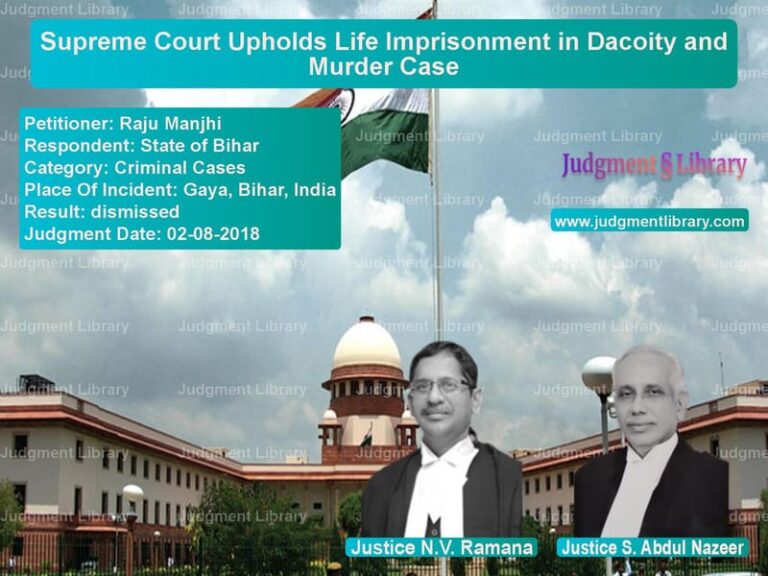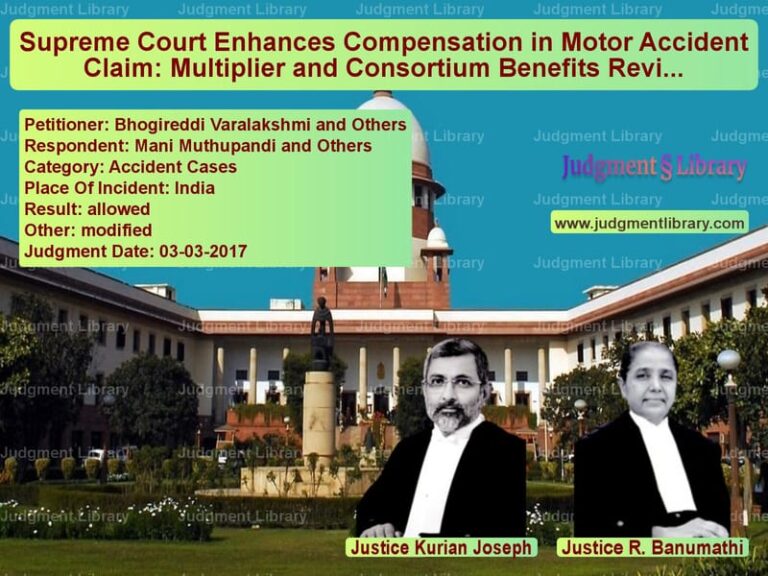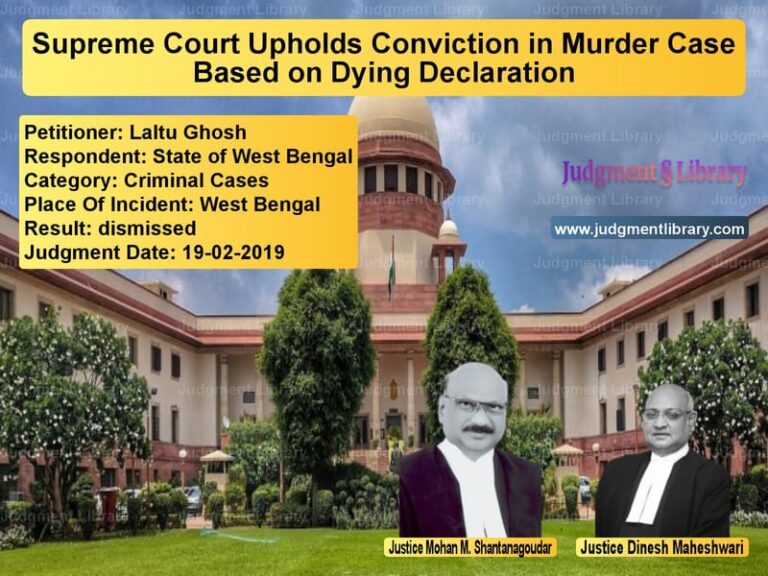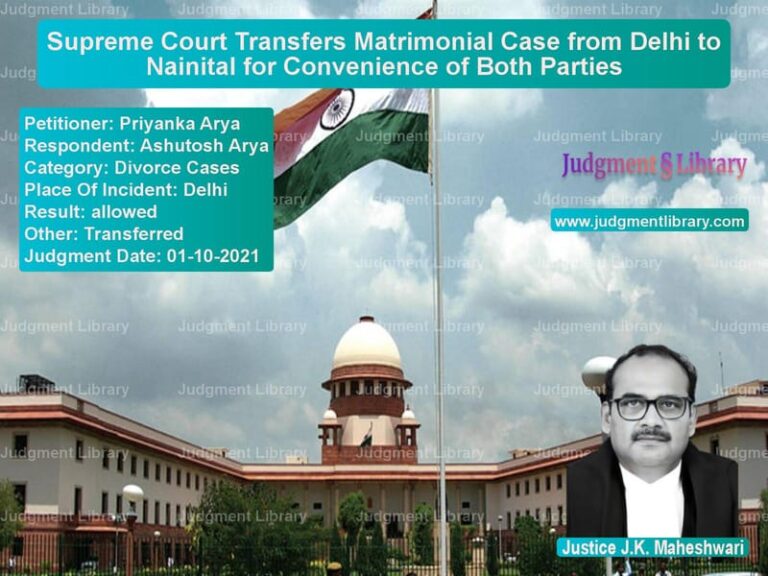Supreme Court Modifies Sentence in Attempt to Murder Case After 20-Year Legal Battle
Criminal cases involving grievous hurt and attempt to murder often result in prolonged legal battles. The case of Naresh & Ors. vs. The State of Uttarakhand & Ors. revolved around the conviction of four individuals accused of attacking a person with an axe. The Supreme Court, in its judgment dated April 25, 2018, upheld the conviction but modified the sentence, reducing the imprisonment to time already served while imposing a fine.
This ruling is significant as it balances justice with humanitarian considerations, considering factors such as the passage of time and the health condition of one of the accused.
Background of the Case
The case pertained to an incident that took place on May 26, 1998, in Haridwar, where four accused—Naresh, Suresh, Ashish, and Rajendra—allegedly attacked Tej Singh with an axe, causing multiple injuries. A First Information Report (FIR) was registered the next day, and the accused were put on trial for offenses under:
- Section 307 (Attempt to murder)
- Section 323 (Punishment for voluntarily causing hurt)
- Section 324 (Voluntarily causing hurt by dangerous weapons)
- Section 504 (Intentional insult with intent to provoke breach of peace) of the Indian Penal Code (IPC).
The prosecution produced medical evidence indicating that Tej Singh suffered seven injuries, including abrasions, contusions, and a lacerated wound.
Legal Proceedings
Trial Court Decision: The Additional Sessions Judge, Haridwar, in its judgment dated March 16, 2011, acquitted all four accused due to lack of conclusive evidence.
High Court Decision: The complainant and the State of Uttarakhand appealed before the High Court of Uttarakhand at Nainital. The High Court, in its judgment dated July 10, 2017, reversed the trial court’s acquittal and sentenced the accused as follows:
- Naresh (A-1): 5 years rigorous imprisonment under Section 307 IPC, along with fines for other offenses.
- Suresh (A-2): Sentenced under Section 307 IPC but given 2 years rigorous imprisonment due to advanced lung cancer.
- Ashish @ Shesh Raj (A-3) and Rajendra (A-4): Similar sentencing as Naresh.
The accused then approached the Supreme Court.
Key Legal Issues
The Supreme Court examined the following issues:
- Whether the High Court was justified in reversing the trial court’s acquittal.
- Whether the severity of the punishment was appropriate given the passage of time.
- Whether humanitarian considerations should influence sentencing.
Arguments by Both Parties
Petitioner’s Argument (Naresh & Ors.):
- The High Court erred in reversing the acquittal.
- Twenty years had passed since the incident, and the accused had led a crime-free life since then.
- Suresh (A-2) was suffering from advanced lung cancer, necessitating leniency.
Respondent’s Argument (State of Uttarakhand & Complainant):
- The trial court’s acquittal was flawed, and the High Court correctly convicted the accused.
- Given the nature of the injuries, the punishment awarded was justified.
- Justice should not be diluted due to the passage of time.
Supreme Court’s Observations
The Supreme Court, comprising Justices R.K. Agrawal and Abhay Manohar Sapre, upheld the conviction but modified the sentence.
Key Excerpt from the Supreme Court Judgment:
“Considering that 20 years have passed, and the injuries did not lead to permanent disability, it is appropriate to modify the sentence while ensuring justice to the victim’s family.”
The Court further held:
“We uphold the High Court’s finding of guilt but reduce the sentence to the period already undergone. Additionally, the fine is enhanced to Rs. 75,000 per accused, to be paid to the victim’s legal representatives.”
Final Verdict
The Supreme Court ruled:
- The conviction of Naresh, Ashish, and Rajendra under Sections 307, 323, 324, and 504 IPC was upheld.
- Their jail sentence was reduced to time already served.
- The fine was enhanced to Rs. 75,000 per accused (total Rs. 2,25,000) to be paid to the victim’s legal heirs.
- Suresh (A-2) was fully acquitted due to medical reasons.
Impact of the Judgment
This ruling has significant implications for criminal law:
- It emphasizes that passage of time and good behavior post-conviction can influence sentencing.
- It sets a precedent for humanitarian considerations in criminal sentencing.
- It ensures that justice is served while balancing reformation and punishment.
Conclusion
This judgment demonstrates the Supreme Court’s pragmatic approach to criminal sentencing. While upholding convictions based on evidence, the Court exercised its discretion to modify punishments based on humanitarian factors and the passage of time.
Petitioner Name: Naresh & Ors..Respondent Name: The State of Uttarakhand & Ors..Judgment By: Justice R.K. Agrawal, Justice Abhay Manohar Sapre.Place Of Incident: Haridwar, Uttarakhand.Judgment Date: 25-04-2018.
Don’t miss out on the full details! Download the complete judgment in PDF format below and gain valuable insights instantly!
Download Judgment: Naresh & Ors. vs The State of Uttarak Supreme Court of India Judgment Dated 25-04-2018.pdf
Direct Downlaod Judgment: Direct downlaod this Judgment
See all petitions in Attempt to Murder Cases
See all petitions in Bail and Anticipatory Bail
See all petitions in Custodial Deaths and Police Misconduct
See all petitions in Judgment by R K Agrawal
See all petitions in Judgment by Abhay Manohar Sapre
See all petitions in partially allowed
See all petitions in Modified
See all petitions in supreme court of India judgments April 2018
See all petitions in 2018 judgments
See all posts in Criminal Cases Category
See all allowed petitions in Criminal Cases Category
See all Dismissed petitions in Criminal Cases Category
See all partially allowed petitions in Criminal Cases Category







